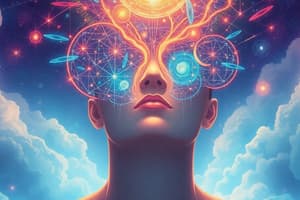Podcast
Questions and Answers
Which of the following domains of the self is characterized by characteristics that a person would like to possess?
Which of the following domains of the self is characterized by characteristics that a person would like to possess?
- Ought self
- Ideal self (correct)
- Actual self
- True self
In the context of online anonymity, what opportunity does it provide individuals with?
In the context of online anonymity, what opportunity does it provide individuals with?
- To showcase their 'actual self'
- To present their 'ought self'
- To express any of the three selves proposed by Higgins (1987) (correct)
- To hide their 'ideal self'
According to Suler (2002), what does the term 'true selves' refer to?
According to Suler (2002), what does the term 'true selves' refer to?
- Characteristics that are anti-normative or deviant
- Characteristics that one is obligated to possess
- Hidden aspects of what an individual needs or wishes to be (correct)
- Characteristics an individual actually possesses
How does online interaction differ from face-to-face interaction based on Ellison et al. (2006)?
How does online interaction differ from face-to-face interaction based on Ellison et al. (2006)?
Why might identity empowerment potentially occur in the online environment based on the text?
Why might identity empowerment potentially occur in the online environment based on the text?
What distinguishes Facebook identities from those in a fully anonymous online world?
What distinguishes Facebook identities from those in a fully anonymous online world?
How are 'hoped-for possible selves' different from 'ideal selves' according to Higgins (1987)?
How are 'hoped-for possible selves' different from 'ideal selves' according to Higgins (1987)?
How do 'gating characteristics' impact the materialization of 'hoped-for possible selves'?
How do 'gating characteristics' impact the materialization of 'hoped-for possible selves'?
In what type of environment do people tend to express their 'hoped-for possible selves'?
In what type of environment do people tend to express their 'hoped-for possible selves'?
What is the main difference between 'real/true selves - offline selves' and 'virtual selves - online selves' as challenged in 2008?
What is the main difference between 'real/true selves - offline selves' and 'virtual selves - online selves' as challenged in 2008?
Flashcards are hidden until you start studying




